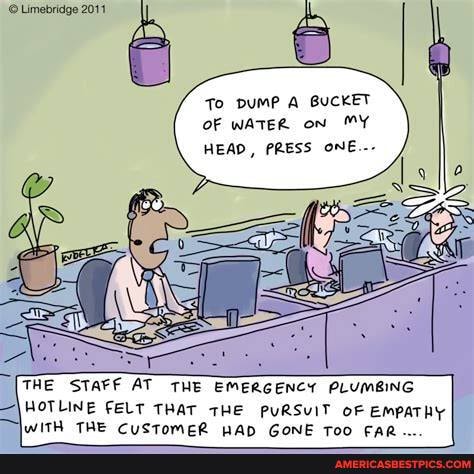Keep your technical knowledge close in the tool bag; emotional intelligence is a highly valued personal trait that can help you run a more successful business. We’ve all heard the expression before, “You’re thinking with you heart and not your head.” But what if both were true? On a recent Thursday night Plumbing Perspective (@plumbing_perspective) Instagram Read more
confidence

Keep your technical knowledge close in the tool bag; emotional intelligence is a highly valued personal trait that can help you run a more successful business.
 We’ve all heard the expression before, “You’re thinking with you heart and not your head.” But what if both were true? On a recent Thursday night Plumbing Perspective (@plumbing_perspective) Instagram Live, guest Shreya Nagwani (@_shreymvp), sales/service expert and coach for Service MVP, discussed an interesting aspect of Service MVP’s training that translates to running a successful business. It’s called Emotional Intelligence or EQ. Almost counterintuitive—because of the opposite nature of how people can think one way and act another—the term actually makes an abundant amount of sense.
We’ve all heard the expression before, “You’re thinking with you heart and not your head.” But what if both were true? On a recent Thursday night Plumbing Perspective (@plumbing_perspective) Instagram Live, guest Shreya Nagwani (@_shreymvp), sales/service expert and coach for Service MVP, discussed an interesting aspect of Service MVP’s training that translates to running a successful business. It’s called Emotional Intelligence or EQ. Almost counterintuitive—because of the opposite nature of how people can think one way and act another—the term actually makes an abundant amount of sense.
According to Harvard Business School, Emotional intelligence is defined as the ability to understand and manage your own emotions, as well as recognize and influence the emotions of those around you. The term was first coined in 1990 by researchers John Mayer and Peter Salovey, but was later popularized by psychologist Daniel Goleman. (Goleman lists five components of EQ below.)
In the realm of home service sales, emotional intelligence (EQ) often takes a backseat to technical expertise. However, it is a critical component that should not be overlooked. EQ refers to the ability to understand and manage emotions effectively, enabling individuals to relieve stress, communicate well, empathize, overcome challenges, and defuse conflicts. In the sales process, where emotions heavily influence buying decisions, focusing on logical reasoning alone can leave clients hesitant.
But how does it translate into plumbing and HVAC business? While plumbing and HVAC techs have a high IQ, and what they communicate is overly technical, a non-technician, i.e., customer, doesn’t understand what that means, says Nagwani. “All they want is safety, comfort and health for their family and their home.”
 Home service technicians, typically analytical and left-brained, tend to prioritize the logical aspects of their work, inadvertently neglecting the emotional side of the sales process. The gap lies in the lack of training on communicating solutions in an emotionally intelligent manner. To successfully bridge this gap, technicians must be equipped with the skills to connect with customers on a deeper level, understand their unique needs, and present solutions that resonate emotionally.
Home service technicians, typically analytical and left-brained, tend to prioritize the logical aspects of their work, inadvertently neglecting the emotional side of the sales process. The gap lies in the lack of training on communicating solutions in an emotionally intelligent manner. To successfully bridge this gap, technicians must be equipped with the skills to connect with customers on a deeper level, understand their unique needs, and present solutions that resonate emotionally.
“It’s a very emotional job,” says Nagwani, but there is a gap. “To bridge the gap would be learning emotional intelligence. How do I communicate this job, which is just a plumbing job, to something like, ‘What is the effect of this system for their family? If they have chlorine in their water and their son has eczema.’ That’s how you connect emotional intelligence to a plumbing job,” says Nagwani.
And, not only that, people buy things when they have high self-esteem, when they feel like they deserve it. “People who have a high self-esteem buy premium,” says Nagwani.
How do to techs learn how to communicate that? “What we teach—in part—in our Service MVP offerings is, how do you raise someone’s self-esteem during a visit that by the end of the appointment the client feels better about themselves as a person? What happens is they’ll pick an option,” says Nagwani. “‘I deserve endless hot water,’ for example, connecting a technician’s job over to emotional intelligence.”
Moreover, sometimes it can be difficult exude confidence, stability, empathy on a tremendously busy schedule. “It’s confidence. Even if it’s not a lack of confidence, it comes off that way. This also goes to managers and owners. If your’re giving your guys six or seven calls on the board, they would see all of the calls stacked up and it would really affect the way they ran those calls and they would burn through all of them. They are just thinking of getting in and out. That is going to affect the service to the client, the job, the revenue and the happiness of the technician.
“We have a rule where a technician can see only one call at a time and they get a long time on that call. They have all the time they need; it’s quality over quanitity. What starts to happen is, there are less upset clients, there are more 5-star reviews, they triple their revenue, literally. The confidence of the technician is really important. How is somebody going to be confident when they don’t have communications training?” says Nagwani.
By incorporating emotionally intelligent communication techniques, technicians can establish a stronger connection with customers. Understanding and addressing customers’ emotions not only builds rapport but also allows for customized solutions that meet their specific needs. Training programs, such as those offered by Service MVP, specialize in teaching teams to utilize emotionally intelligent approaches. Implementing these techniques can lead to a significant increase in revenue per technician, averaging at 297%. This approach enhances customer satisfaction, improves conversion rates, and fosters long-term customer loyalty.
Goleman’s 5 Components of EQ
- Self-Awareness: Recognizing and understanding your own strengths and weaknesses, your emotions and moods, and the effects these things have on other people. A self-aware person is not easily offended by criticism, but rather learns and adapts.
- Self-Regulation: To think before doing and to express your feelings maturely with restraint. Rather than being controlled by emotions and impulses, an emotionally intelligent person can control impulses and emotional responses.
- Internal Motivation: High EQ people are self-motivated, pursuing personal goals for reasons of self-development and self-gratification, rather than money, titles, external praise or esteem.
- Empathy: Empathy involves recognizing, understanding and feeling the emotions of others. Unlike sympathy, empathy involves actually sharing the emotional experience another person is having. Empathetic people genuinely understand and respond to the needs of others.
- People Skills: Emotionally intelligent people easily build trust and respect with others. They are good at managing relationships and building networks, and they avoid power struggles and deceitfulness. Their high levels of the first four components of EQ make for deep bonds and genuine, non-competitive friendships.
Source: Forbes.com
Service MVP is an e-learning website featuring video-based micro-learning content designed to revolutionize your office, service, sales and install teams. It is the ultimate service sales training resource, where high performers increase the value of their solutions to create higher revenue and profit.
